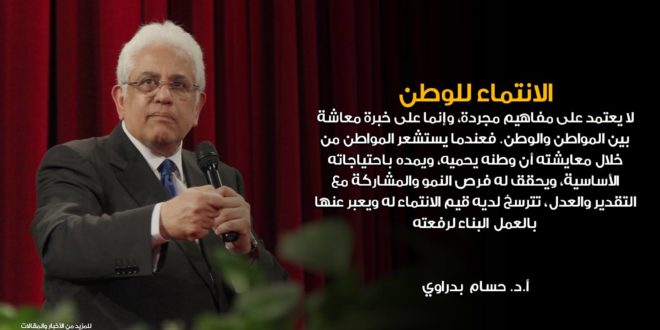We should not separate between identity and citizenship, which in its basic sense is the relationship of the individual to the homeland to which he belongs, which imposes constitutional rights and stipulated duties and more. Positive citizenship is not limited to the citizen’s awareness of his rights and duties only, but his keenness to exercise them through an independent personality. Able to resolve matters for the benefit of this country. The societal application of the concept of citizenship in all institutions leads to the development of a set of values, principles and practices that affect the formation of an individual’s personality and identity, which are reflected in his behavior towards his peers and state institutions as well as towards his homeland.
As for the concept of belonging to the homeland, it can be said that it is the intellectual and emotional connection to the homeland, which extends to include connection with the land, history, people, present and future of the homeland.
Belonging to the homeland does not depend on abstract concepts, but rather on the lived experience between the citizen and the homeland. When the citizen senses through living with him that his homeland protects him, provides him with his basic needs, and provides him with opportunities for growth and participation with appreciation and justice, the values of belonging to him are firmly established and expressed by constructive action to raise him.
The goal of teaching the Arabic language, not only is literacy in form, but the content is the belief that learning the language has a great impact on all aspects of life in any nation. It is an essential part of our identity. Our civilization, and the goal, as I said, is not only reading and writing, it is a narrow short-term goal, but we have to understand that this language is the way we understand each other, that we cannot understand ourselves or each other without thinking, and we do not think in a vacuum, but think The mind in a language, and depicts its thoughts for itself and for others, using the words, sentences, and images that the language draws and transmit from one individual to the other or keep them in memory. From all of this, the identity is formed.
Learning the mother tongue, and any other language at an early age, trains the individual to think about multiple languages, and it is generally accepted that children are better able to learn multiple languages than adults. Children’s writing, reading and comprehension abilities from the age of eight to nine years with scientific measurement tests.
And now it is in the minds, and does the meaning of learning a second language or using foreign references threaten the identity. Is it correct for the child not to learn another language in the early stages of education.. The unequivocal answer is no.. Teaching another language does not threaten identity and does not threaten knowledge of the mother tongue unless teaching the mother tongue is incomplete and weak. A child can absorb more languages than adults, and we should not forget that teaching a second language will overcome his Arabic language and make his thinking and identity linked to another nation. We are like those who do not want to enter the field of knowledge with others for fear of defeat, and we prefer our victory without competition.
Identity, as I said, is linked to language, but it is also linked to coexistence in the classroom and what the student studies in terms of history and geography, and a conscience that is formed in the classroom, at school, and at home with the family.
Our children who are learning the second language in the more than 45,000 government schools, most of them do not speak the correct Arabic or the correct foreign language. Arab identity and national thought that confirms the Egyptian identity with its multiple sources.
We have to be more realistic when we discuss identity, belonging and citizenship, because instilling it in the child’s conscience is complex and multi-entrance, and we should not close the door to learning other languages, because we are unable to lead the multiple entrances to the identity of the Egyptian person.
Children in German education, strong in the question of identity, are obliged to learn English at the age of 8 to 9, but statistics say that English language instruction takes place from an earlier age in Germany, reaching more than 60 percent of its schools. Noting that the school has the right to come early and does not have the right to delay the start of learning English, because schools have decentralized freedoms in decision-making. The mandatory order establishes a minimum level and raises the ceiling of flexibility.
I say this because the debate about the 800 experimental schools that teach science, mathematics and technology in English, should continue to do so while raising the level of the Arabic and English languages, not canceling the system.
In the end, there are eight hundred schools among more than fifty thousand schools run by the state, whose sciences are taught only in Arabic, yet most of them miss the quality we wish for and the mastery of the language we seek.
 Dr. Hossam Badrawi Official Website
Dr. Hossam Badrawi Official Website


